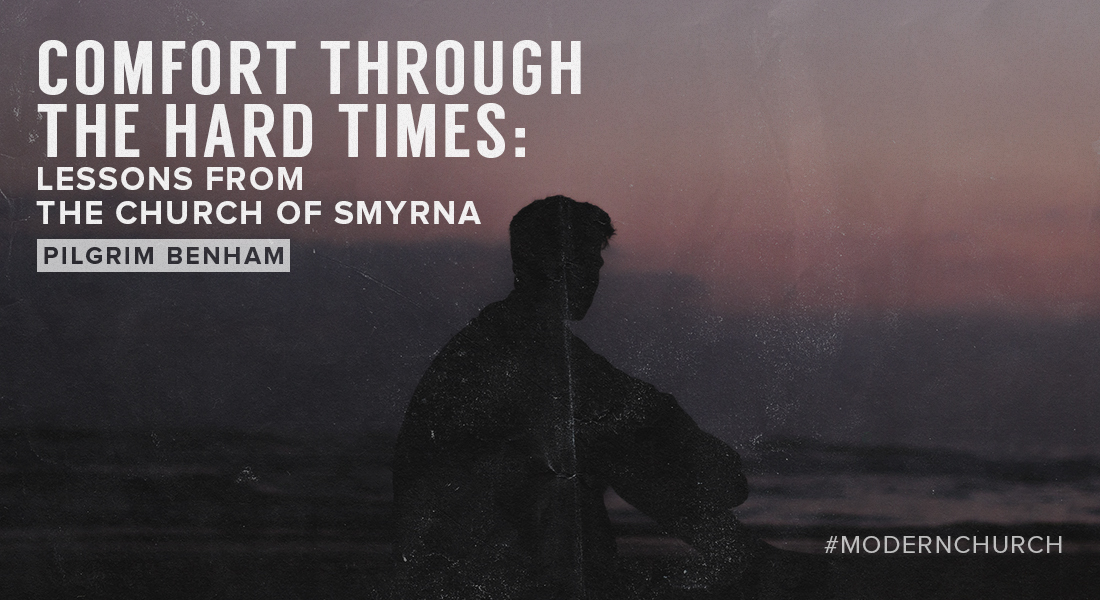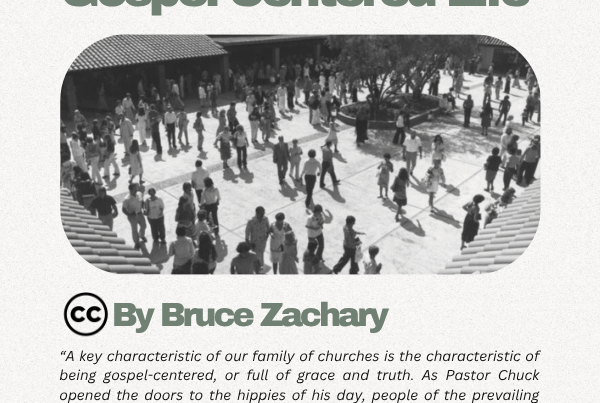
Enjoy “A Letter to the Modern Church” by Pilgrim Benham in this series on the seven churches in Revelation.
….
The theologian Michael Stipe (the lead singer of R.E.M.) said it best, “Everybody Hurts.” Let’s just face it: Life is full of heartache. In my short life, I’ve seen a lot of pain and suffering: A member of my family was sexually, physically and emotionally abused as a child and teen. My little sister, born with a cleft pallet in her lip, blind and deaf, with extra fingers and toes and lots of physical deformities, only lived six short months before going to be with Jesus. My other sister lost her full academic scholarship at a prestigious arts school because of a simple mistake on the tuition scholarship paperwork. A family member forgot who people were with the symptoms of dementia and eventually passed away. Our son was born premature three weeks early from a placental abruption and my wife was mere seconds from hemorrhaging to death. Just in the last five years, our family has been the victim of a hit and run; another time we hydroplaned and crashed our car on a wet bridge over a river on the interstate; and just recently, we’ve had financial setbacks that have caused our family to have to seek the Lord and wonder how we are going to pay some bills.
Think about the tragedy in your own life: People who have let you down, friends who you thought were friends who stabbed you in the back, that promotion you deserved was given to someone else, the car that died on the freeway and left you stranded, your bank account that was literally down to dollars, and you didn’t know what you would eat next or losing that loved one tragically before you felt it was their time to go.
As you read this and nod your head, let me encourage you that you’re among friends. Life is full of suffering. In fact, suffering is inevitable.
One person said:
“Christians, of course, use spiritual language to minimize suffering constantly, even their own. The need to exonerate God in the midst of tragedy–even to shove Bible verses in a person’s face can be just as harmful as saying something actively discouraging, as if God were small enough to be invalidated by our individual suffering.”
What should our reaction be to pain and difficulty? We learn much by looking at the church of Smyrna, spoken to by Jesus in Revelation 2:8-11. In this section of Scripture, Jesus is speaking to John the Apostle, who has been exiled on the island of Patmos. Jesus has come to reveal Himself–literally to unveil Himself–thus the book is called not “Revelations” but “Revelation” for it is one singular revelation of the person and work of Jesus over and in His creation. Jesus has a message for seven distinct churches in Asia Minor. These were literal churches with a congregation and pastors, and so Jesus has a word for them. But this is also applicable to all churches, to every church and even to us today almost 2,000 years later. For each of the churches that Jesus addresses, we see He seems to emphasize a City, a Characteristic of Christ, a Commendation, a Criticism, a Correction and a Crown.
The City of Smyrna
The city of Smyrna was located around 35 miles north of Ephesus and was established by Alexander the Great. Of the seven cities Jesus addresses, Smyrna was considered by far to be the most beautiful. It was known as “the glory of Asia” and was a very beautiful and important city in the Roman empire, thought by many to be the birthplace of Homer, where a temple was erected in his honor.
What is interesting is that “Smyrna” is the Greek word for “myrrh” which means “bitter.” Myrrh is a small fruit just larger than a pea, and it’s known for the fragrance it gives off when it is crushed. Myrrh was one of the three gifts that the Magi brought to baby Jesus, along with gold and frankincense.
Now at first glance, myrrh would have seemed a little random as a present at a baby shower. Gold would be the appropriate gift for the Messiah King, a gift appropriate for royalty. Incense as well: a wick that would be lit and would give off fragrant smoke in the presence of the king–a picture of the priesthood. But myrrh might have seemed a little random. Myrrh was one of the ingredients used in the anointing oil that the priests used in the temples. It may have seemed completely pointless as a gift for Jesus, but under the inspiration of the Holy Spirit, the Magi gave the myrrh as a symbolic gift, a gift that really was appropriate for Jesus: being crushed and giving off an aroma that would be pleasing to the world.
How significant! Smyrna was where these believers were feeling the pressure, the squeeze of persecution all around. Many of them would be crushed, but Jesus assures them that their sacrifice is a fragrant offering to Him.
The Characteristic of Christ
“And to the angel of the church in Smyrna write, ‘These things says the First and the Last, who was dead, and came to life.”
Here, Jesus chooses to describe Himself as “The First and the Last,” a reference to chapter one where He called Himself the Alpha and the Omega. The Alpha is the first letter in the Greek alphabet, and the Omega is the last letter. In English, you could hear Jesus saying, “I am the A, and I am the Z.”
Now I’m not a cyclist, but I have been cycling quite a few times and always seemed to regret it! When cycling in a group, you need a strong front rider who can see what is up ahead and warn those behind of the coming rocks and bumps and hazards in the road, set the pace and take the brunt of the wind resistance. But, the person in the “caboose” position also needs to be an experienced rider, who can speak encouragement to those getting weary and help them stay in the race. In like manner, Jesus is ahead of us saying, “I’ve been through suffering and death, and I’ll lead you along the way,” but He’s also behind us saying, “You can do it; don’t give up!”
Not only is He the First and the Last, but He also identifies Himself as the One, “who was dead and came to life.” What an encouragement for people facing persecution, suffering, pain and even martyrdom! To know that Jesus died and came to life again gives us incredible comfort when we face pain in life.
Smyrna had been a Greek colony as far back as 1,000 B.C. Around 600 B.C. it was invaded and destroyed by the Lydeans, and for 400 years there was no city there at all. Just ruins. Then around 200 B.C. Lysimachus had it rebuilt as a planned and unified city. It was built with streets that were broad, straight, sweeping and beautifully paved. The city had experienced death and had literally been brought back to life.
The Commendation & Criticism
Jesus’s commendation is significant because He has no criticism!!! Verse nine says:
“I know your works, tribulation, and poverty (but you are rich); and I know the blasphemy of those who say they are Jews and are not, but are a synagogue of Satan.”
Jesus said He knew four things about them:
1. Jesus knows their performance.
“I know your works:” That is the same phrase Jesus used when speaking to the church of Ephesus. The church in Smyrna likewise was working as unto the Lord, and Jesus recognized their ministry.
Some of us from time to time may wonder if the Lord knows our works. Some of us have been serving Him for decades, and we don’t want the recognition from man or from the church; but we just wonder, “Does the Lord see or know or care what I’m doing for His kingdom?”
I love this encouragement from Hebrews 6:10:
“For God is not unjust so as to overlook your work and the love that you have shown for his name in serving the saints, as you still do.”
God sees. God knows. God won’t overlook it.
2. Jesus knows their pain.
The Greek word can be translated: tribulation, affliction, trouble, anguish, persecution, burdens. I would add the word pain. Jesus is saying, “I know you look afflicted and poor, but I consider you rich!”
Why does it seem to take suffering to remind us that God is sovereign and will work everything out for our good and His glory?
Business leader Allan Emery tells of accompanying his friend and mentor to visit a hospitalized employee. The patient lay very still, his eyes conveying anguish. His operation had taken eight hours, and recovery would be long and uncertain.
“Alex,” said Ken quietly, “You know I have had a number of serious operations. I know the pain of trying to talk. I think I know the questions you are asking. There are two verses I want to give you—Genesis 42:36 (“All these things are against me”) and Romans 8:28 (“All things work together for good to those who love God”). We have the option of these two attitudes. We need the perspective of the latter.”
David Jeremiah adds, “The choice is this: to be beat up or to be upbeat. The perspective you choose will color your life completely and thoroughly—will it be gentle tones of grace and providence, or harsh slashes of despair and emptiness?
We need to have a Biblical view of suffering. Just consider myrrh, of which the city of Smyrna was named after. When you anoint something, you put something over it. You anoint someone with oil, it means you put oil over them, on them, and it runs down their forehead and covers them. When the myrrh fruit was crushed, it gave off an aroma and was also used to anoint the priests. Think about that: The same oil that was once bruised and crushed ended up becoming something that qualified a man to stand in the gap for sinners and intercede for them. If you have suffered, you are now someone who can use that pain as a way to minister to others. What an appropriate gift for Jesus by the Magi: gold (for a king), frankincense (for a burial) and myrrh (to anoint a priest). We are most effective after we have been greatly bruised and broken–and an aroma that is pleasing to the Lord rises from our suffering.”
3. Jesus knows their poverty.
In fact, Jesus states that they are actually rich. The word for poverty means abject or absolute poverty. They had absolutely nothing. That was because of the persecution they were facing. Jesus is not unaware of our helpless state, both spiritually and otherwise.
4. Jesus knows their persecution.
“And I know the blasphemy of those who say they are Jews and are not, but are a synagogue of Satan.”
The Jews in Smyrna were particularly against Christianity. Remember, at this time, Christianity was considered a sect of Judaism. The Jews knew the Christ-followers were different, but to the Roman empire, there wasn’t a lot to distinguish Jew from Christian. Eventually, that changed. Rome considered Judaism to be an ancient religion, whereas when Christianity was eventually distinguished from it, the Roman empire looked with disdain on this new religion. It definitely didn’t help that Christians replaced the buzzphrase of Caesar worship, “Caesar is LORD” with “Jesus is LORD.” Needless to say, it’s doubtful you’re going to make a lot of friends when you are abandoning the mandated worship of the state.
Jesus is saying that when you are facing slander and trouble from people, don’t forget who is really your adversary. It’s not the person in front of you, it’s Satan!
Paul reminds us in Ephesians 6:12 that, “Our struggle is not against flesh and blood, but against the rulers, against the authorities, against the powers of this dark world and against the spiritual forces of evil in the heavenly realms.”
You’re not fighting against your coworkers, your professors, your in-laws, your clients, that one antagonist guy in the office, the people slandering you on their blog, or through that email they sent you—your struggle isn’t against flesh and blood! It’s against the spiritual forces of evil in the heavenly realms!
The Correction
“Do not fear any of those things which you are about to suffer. Indeed, the devil is about to throw some of you into prison, that you may be tested, and you will have tribulation 10 days. Be faithful until death, and I will give you the crown of life. ‘He who has an ear, let him hear what the Spirit says to the churches. He who overcomes shall not be hurt by the second death.”’
Jesus’ correction for them is to not fear. They were about to have 10 days of tribulation, including prison. This could have literally been 10 days, or as some have said there were 10 Caesars that violently persecuted Christians during this time, and it may refer to them. Either way, what is most important is that their suffering would be temporal. This promise would encourage them that there was an end in sight to their suffering.
It wasn’t some fairy-tale Christian-produced movie where everything works out perfectly and is neatly wrapped up before the credits. Jesus isn’t sugar coating hardship. He’s telling them it is about to get worse, a lot worse, even resulting in death. Notice there is no promise of an end to the suffering, only a reward for suffering.
The Christians had a choice, to compromise or be faithful. You see, Caesar worship was required by Rome. If you worshiped Caesar, you would be allowed to go to a hearing where they would grant you a certificate and say, “Caesar is my God,” and they wouldn’t touch you from that point on. If you didn’t have a certificate, they could question you and certainly if you said, “I don’t bow to Caesar; I bow to Jesus Christ,” that would be a threat to Pax Romana, the peace that Rome kept with a sword, and you would be at risk for execution.
Some Christians said, “Come on, just lie and go get the certificate and spare your family! It doesn’t mean anything to you anyway; it’s just telling them what they need to hear.” Other Christians said, “No way, I’m not compromising whom I worship. If they want to take me to my death, to my death I will go.” And so there was this conflict. What would you do?
Many of us would run from suffering because of fear, and we would just lie and get the certificate to spare our lives and the lives of our families.
But Jesus here says, “Don’t be afraid; don’t run!”
The Crown
Sometimes we are surprised by our suffering. It seems to come out of nowhere. And sometimes it seems like it will never end. But we aren’t to be surprised. We are to be ready. We are to endure to the end, even if that end includes death. Why? Because Jesus promises a crown. For the Smyrnese, it would be the crown of life–to not be hurt by the second death.
“Be faithful until death, and I will give you the crown of life. ‘He who has an ear, let him hear what the Spirit says to the churches. He who overcomes shall not be hurt by the second death.”’
The crown of life here is reminiscent of the athletic crown of leaves given out to those who won the agony of a competition. They would be rewarded for being victorious. “Oh death, where is thy victory, where is thy sting?” Because of Someone who conquered, we don’t have to be afraid of death. And that Conqueror’s name is Jesus, the One who died and who came to life again.
Consider Jesus, and the suffering He endured. “Gethsemane” means “olive press.” It has the same meaning that myrrh does. Jesus had to suffer, to give His life as a ransom for many. He did so for others, for you and me.
Peter, who was eyewitness to Jesus’ suffering, uses this as the motivation for you and I in our sufferings:
“Therefore, since Christ suffered in his body, arm yourselves also with the same attitude, because he who has suffered in his body is done with sin. As a result, he does not live the rest of his earthly life for evil human desires, but rather for the will of God” (1 Peter 4:1-2).
“Be self-controlled and alert. Your enemy the devil prowls around like a roaring lion looking for someone to devour. Resist him, standing firm in the faith, because you know that your brothers throughout the world are undergoing the same kind of sufferings. And the God of all grace, who called you to his eternal glory in Christ, after you have suffered a little while, will himself restore you and make you strong, firm and steadfast. To him be the power forever and ever. Amen”(1 Peter 5:8-11).









